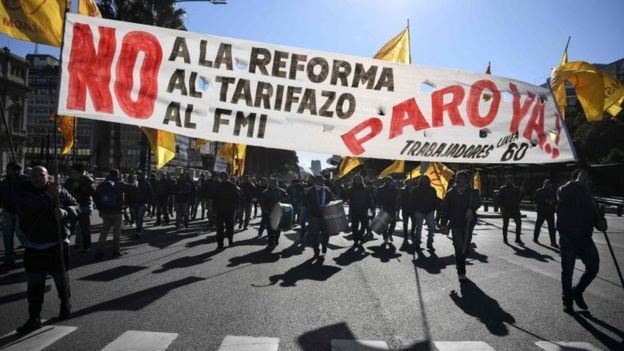Argentina economy crippled by strike
June 26, 2018 | Expert Insights

Argentina’s economy was brought to a standstill by a 24-hour strike called by the General Confederation of Workers (CGT) to oppose austerity measures on 25th June.
Unions have been averse to the President Mauricio Macri’s $50 billion stand-by loan with the International Monetary Fund (IMF).
Background
Known as ‘The Land of Silver,’ Argentina is the 8th largest country in the world with an expansive coastline with a diverse landscape varying from Andean glaciers to the Pampas grasslands. The largest land border is shared with Chile to the West.
The area now known as Argentina was relatively sparsely populated until Spanish colonisation in the 16th century. The country gained independence in 1810 and the first stable nationwide government was founded in 1862. Argentina soon implemented new agricultural technologies, organizational strategies, and foreign investments to help grow its economy, and from 1880 to 1930, it was one of the world's ten wealthiest nations.
The interwar years and the opening of the Panama Canal led to a disruption of trade and investment within the country. The 1930s Great Depression severely affected Argentina’s agricultural output and resulted in a series of coups that ended in the 1980s. Argentina adopted a free-market approach in the 1990s.
Argentina's economy is based on an abundance of natural resources, a highly literate population, and an export-oriented agricultural sector. Although Argentina is an industrialised country, its exports continue to be dominated by agricultural products. Current economic practices are directly derived from the Peronist populist ideology which upholds the juxtaposition of labour unions with industrialisation. Argentina saw a reversal in growth trends that the country has been unable to reel from. This has popularly been studied as the “Argentine Paradox.”
The Macri administration has sought to improve export competitiveness and encourage foreign investment since being voted to power in 2015. The government implemented reforms to open up the Argentine economy including a unified, floating exchange rate, adjustment of tariffs and subsidies, reduction of export taxes, and deregulation of the economy to make the country more attractive to foreign investment.
In 2016, the World Bank downgraded Argentina from a high-income to upper-middle-income economy. As of 2017, the economy was growing at 2.5%, and public debt was approximately 54% of GDP. The Peso has fallen 25% against the dollar since the beginning of 2018. Argentina appealed to the International Monetary Fund (IMF) for an emergency credit package of $30 billion in May.
Analysis
After the coup d'état of 1943, the General Confederation of Workers (CGT) leaders embraced the pro-working class policies of the Labour Minister, Col. Juan Perón. The number of unionized workers grew to 2.5 million during the Perón years where welfare schemes and projects were supported by the CGT. It is now Argentina’s largest labour union and a staunch critic of Macri’s administration. The strike is the third CGT-organized protest since April 2017 and by far the one with the most popular support.
The strike, called two weeks ago by the CGT bureaucracy, was supposedly meant to “send a message” of working class opposition to austerity policies by the Macri administration, in the context of accelerating consumer price inflation that is driving many Argentine workers into poverty. The unions are offering a new round of negotiations with Macri over wages and labor reforms.
President Macri reached an agreement with the International Monetary Fund’s (IMF) Christine Lagarde granting Argentina a $15 billion installment on a $50 billion rescue package on 7th June. Lagarde praised Macri for moving swiftly, in the context of international financial volatility, to counter the capital flight that had weakened the Argentine peso and exacerbated the nation’s ongoing debt crisis. The agreement with the IMF received a strong endorsement from US Treasury Secretary Steven Mnuchin.
Many Argentines blame IMF-imposed austerity policies for aggravating a 2001-2002 economic crisis that plunged millions into poverty. While Macri’s government claims that social welfare programs will remain untouched, unions argue that rising imports and utility prices have already done harm to the working class. Macri, a free-market businessman, scrapped many subsidies his predecessors had granted on a variety of services, most notably electricity, gas, and water.
In an interview with local Tandil newspaper, El Eco, Macri said that the strikes "do not make sense because there has not been a government in decades that cares so much about employment, about workers, about generating new opportunities and strengthening the existing businesses we have in order to create new ones.”
Workers across industries including public transport, ports, education, and banking participated. Nearly 600 flights were cancelled, affecting at least 71,000 passengers, according to the transport ministry. The strike also hit food sales, petrol stations, schools, banks and ports. Roadblocks hampered traffic in the capital, Buenos Aires.
Assessment
Our assessment is that, as stated previously, IMF’s rescue package for Argentina with a standby agreement over $50bn has clearly brought a life line back to the economy. We believe that the bond market will rally as the country has sufficient capacity to service its debts. Austerity measures ought to be divided between all income groups so that the Argentinian laity doesn’t have to bear the immense burden. We feel that President Macri and the union leaders may reach a consensus if negotiations take place between them.








Comments